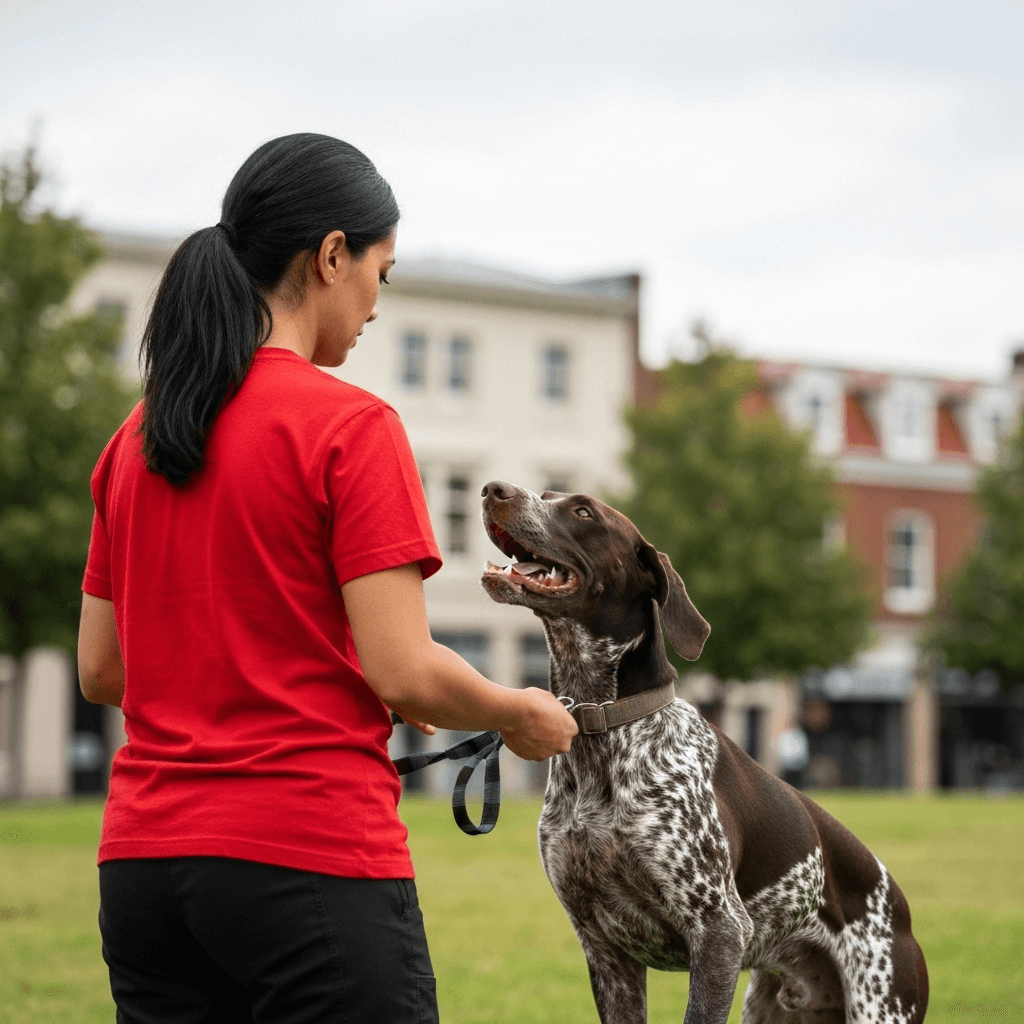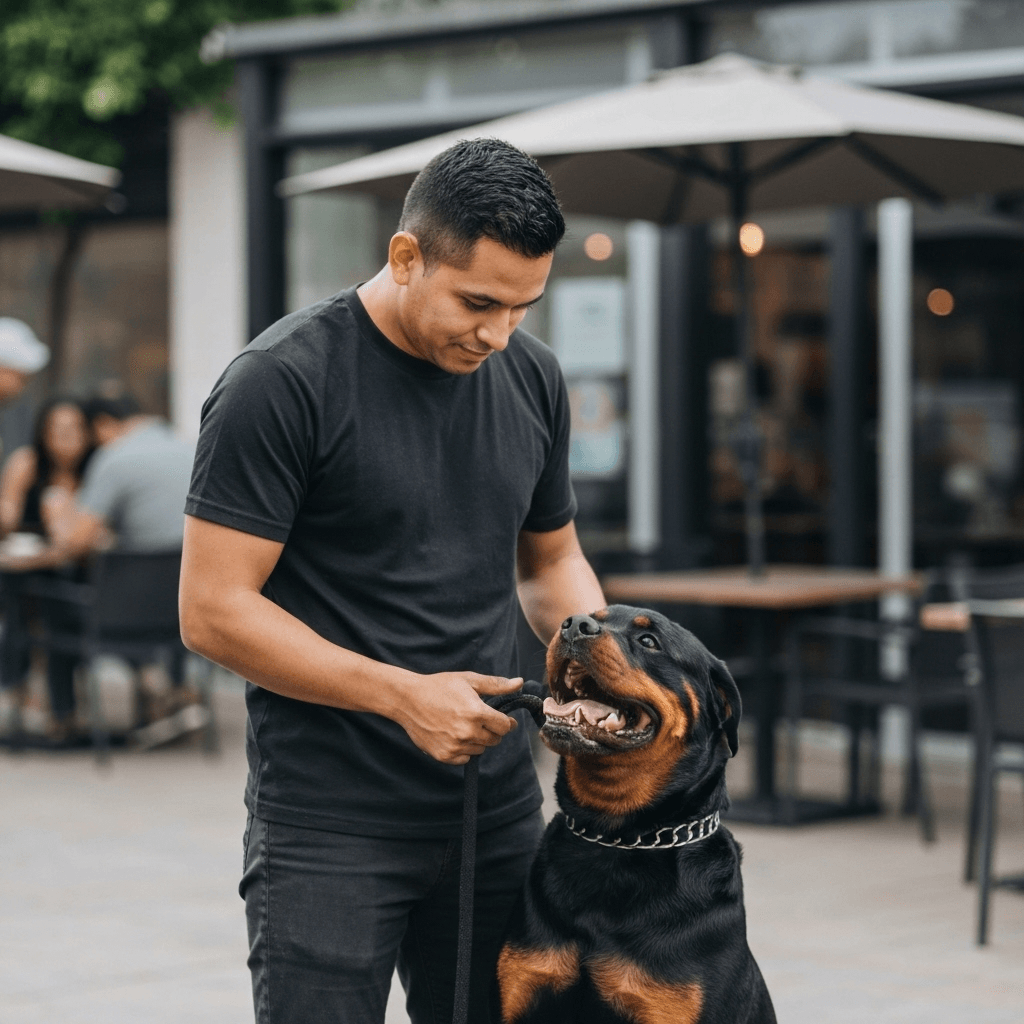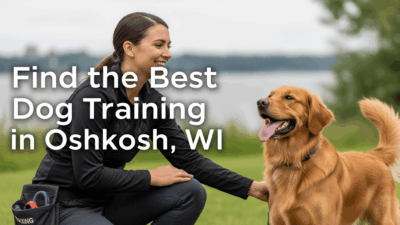Your Complete Guide to Choosing a Dog Trainer in Oshkosh
When you’re walking your dog through downtown Oshkosh or letting them run at Menominee Park, you want to feel confident they’ll listen when it matters. Finding the right trainer here in Winnebago County means looking for someone who understands both your dog’s needs and the specific challenges of living in our community.
Maybe your puppy gets overwhelmed by the college students near UW Oshkosh, or your rescue dog barks at every cyclist on the Riverwalk. Whatever brought you here, good training will make life better for both of you.
How to Choose the Right Trainer
The best trainers in the Oshkosh area focus on positive reinforcement training because it builds trust while teaching your dog what you want them to do. They should also understand that every dog is different and create a plan that fits your specific situation.
When you’re comparing trainers, ask about their credentials. Professional certifications show they’ve invested in learning proven methods and follow ethical guidelines. Common ones include CPDT-KA for general training, KPA-CTP for positive methods, and specialized certifications like IAABC-CDBC for complex behavior issues or CBCC-KA for aggression cases.
In-home dog training often works best because your trainer can see exactly what’s happening in your environment. They’ll help with door manners when guests arrive, leash pulling on your usual walking route, and other daily challenges that are hard to recreate in a training facility.
Group classes can be great once your dog has basic skills and can focus around other dogs. But if your pup is still jumping on everyone or gets too excited around other animals, private lessons are usually the better starting point.
Common Dog Training Methods Explained

Good training should prepare your dog for real life in Oshkosh, whether that means walking calmly past other dogs at the farmers market or staying relaxed during Fourth of July fireworks.
Basic obedience covers the essentials: sit, stay, come when called, and loose-leash walking. These skills keep your dog safe and make every outing more enjoyable. Puppy training focuses on socialization, potty training, and gentle introduction to city sights and sounds while they’re still learning about the world.
If your dog has bigger challenges like reactivity toward other dogs, separation anxiety, or resource guarding, you’ll want a trainer experienced in behavior modification. These issues require patience and a structured approach, but they absolutely can improve with the right help.
Some trainers offer day training, where they work with your dog during the day and then teach you what they’ve practiced. Others prefer private lessons where you learn together, or structured training programs that combine different approaches. Group classes work well for dogs who are ready to practice around distractions.
For specialized goals like therapy dog training or service dog training, make sure your trainer has specific experience in those areas. These require different skills and certification processes beyond basic obedience.
Stay away from trainers who rely on fear, intimidation, or tools designed to cause discomfort. These methods might seem faster, but they often create new problems and can damage your relationship with your dog.
Average Cost of ‘dog training in Oshkosh WI’ (Updated for 2025)
Training costs in the Oshkosh area depend on what type of help you need, how experienced your trainer is, and whether they come to your home or you go to them. Here’s what most dog owners in Winnebago County can expect to pay.
| Service Type | Average Cost (Oshkosh/Winnebago County) |
|---|---|
| Puppy classes (4–6 weeks) | $140–$240 total |
| Group classes (4–6 weeks) | $150–$260 total |
| Private lessons (60–75 min) | $90–$160 per session |
| In-home coaching packages (4–6 visits) | $380–$760 total |
| Day training (trainer works your dog + handoff) | $450–$850 per week |
| Initial behavior consult (reactivity/anxiety) | $120–$200 |
| Board and train (2–4 weeks) | $1,800–$3,600 total |
Many trainers charge extra for travel if you’re further out in the county, and complex behavior cases often cost more because they require specialized skills. Always ask what’s included in the price and whether there’s a consultation where you can meet the trainer before committing to a full program.
Questions to Ask a Potential Dog Trainer
Before you choose someone to work with your dog, make sure they’re the right fit. Here are the important questions to ask:
- What training methods do you use, and how do you keep sessions positive for my dog?
- What certifications do you have, and do you continue learning through programs like CPDT-KSA or CTC?
- How will you help us practice in real Oshkosh locations like the Riverwalk or downtown sidewalks?
- Do you offer in-home coaching, group classes, or day training, and which would work best for our goals?
- What’s the total cost, including any travel fees or equipment I’ll need to buy?
- How will we track progress, and what will I need to practice between sessions?
- Do you carry liability insurance?
- If my dog has aggression or severe anxiety, will you work with our veterinarian?
Trust your gut during the consultation. A good trainer will listen to your concerns, explain their approach clearly, and make both you and your dog feel comfortable.
Local Rules and Practical Considerations
Living in Oshkosh means following city ordinances that keep our parks and neighborhoods safe for everyone. Dogs need to be under control in public, and you’re responsible for cleaning up after them anywhere except your own property.
You’ll need a leash in all public areas unless you’re inside a designated off-leash dog park. A standard 6-foot leash works best for training and meets local requirements.
Wisconsin requires current rabies vaccination for all dogs, and you’ll need a local license through your municipal office. For details about licensing in Winnebago County, check Oshkosh dog licensing. State rabies information is available through the Wisconsin Department of Health Services at Wisconsin DHS rabies guidance.
Dog trainers in Wisconsin don’t need special state licensing, but if they offer board and train services, they may need facility permits. If your trainer wants to use city parks for sessions, they should have permits and insurance that covers commercial use of public spaces.
Local Oshkosh Resources for Dog Owners
Oshkosh has some great places to practice training with your dog, whether you’re working with a trainer or on your own. Check Winnebago County Dog Parks for current rules and hours.
Best Friends Dog Park at Winnebago County Community Park offers fenced areas where you can safely practice recall and socialization.
Menominee Park has walking paths that are perfect for practicing loose-leash walking and teaching your dog to ignore distractions like squirrels and playground noise. The Oshkosh Riverwalk gives you a chance to work on polite greetings with other people and staying calm around restaurant patios.
For longer training walks, the Wiouwash State Trail offers a controlled environment where you can practice focus around cyclists and joggers. The Oshkosh Area Humane Society is also a good resource for information about responsible pet ownership in our community.

Common Questions About Dog Training in Oshkosh
How much does in-home dog training cost?
Most trainers in the Oshkosh area charge $90–$160 per session for in-home visits. Many offer package deals if you book multiple sessions, and complex behavior issues usually cost more because they require specialized experience.
Is in-home dog training worth it?
For most dogs, yes. In-home training lets your trainer see exactly what’s happening in your environment and address specific problems like door manners, backyard barking, or leash pulling on your regular walking route.
Can you pay someone to house train your dog?
Absolutely. Many trainers offer puppy training programs or day training that includes potty training, crate training, and establishing routines. They’ll teach you how to maintain the progress between sessions.
What is the 3-3-3 rule for dog training?
This guideline helps set realistic expectations for new or rescued dogs. Most dogs need about 3 days to start feeling safe, 3 weeks to understand your routine, and 3 months to truly settle into their new life with you.
How long will it take to reach my training goals?
Most dogs show significant improvement in 4–8 weeks with consistent practice. But complex issues like fear, reactivity, or aggression often take several months of behavior modification work to see lasting change.
What should I bring to group classes?
Pack high-value treats your dog loves, a regular 6-foot leash, a flat collar or harness, and water for your dog. Bring vaccination records if the trainer requests them, and leave retractable leashes at home since they’re not safe in group settings.
What’s the leash law in Oshkosh?
Dogs must be on leash in all public areas except designated off-leash dog parks. Your dog needs to be under your control, and you must clean up waste wherever you go.
Do I need a dog license in Oshkosh or Winnebago County?
Yes, Wisconsin requires dog licensing through your local municipality once your dog reaches the required age. You can find contact information and requirements at Winnebago County dog licensing.
What shots does my dog need in Winnebago County or Wisconsin?
Rabies vaccination is required by state law. Your veterinarian might also recommend vaccines for distemper, parvovirus, and kennel cough depending on your dog’s lifestyle and exposure risks. More information is available at Wisconsin DHS rabies guidance.
Are dog trainers required to be licensed in Oshkosh or Winnebago County or Wisconsin?
No, Wisconsin doesn’t require special licensing for dog trainers. However, good trainers should carry liability insurance and follow local business regulations. If they offer board and train services, additional facility permits may be required.
Where can I practice off-leash recall?
Best Friends Dog Park is your safest legal option for off-leash practice in the Oshkosh area. Start during quieter times when there are fewer distractions, and always follow posted rules and basic dog park etiquette.
Which dog parks allow training around Oshkosh?
Best Friends Dog Park welcomes training as long as you follow the posted rules and are considerate of other park users. For more variety, you might explore dog parks in nearby communities once your dog is ready for new environments.
What beaches/trails allow dogs for training?
While we don’t have ocean beaches here, the Wiouwash State Trail and various city park paths welcome leashed dogs. These spots are excellent for practicing focus around cyclists, strollers, and wildlife distractions.
How do I choose between private lessons, group classes, and day training?
Start with in-home dog training or private lessons if you’re dealing with specific home behavior issues or if your dog gets overwhelmed around other animals. Move to group classes once your dog has basic skills and can focus with distractions. Consider day training if you want faster progress and don’t mind having less hands-on involvement in the daily training process.
What if my dog is reactive or has a bite history?
Look for trainers with specialized credentials like IAABC-CDBC or CBCC-KA who have experience with serious behavior issues. You’ll need a careful management plan and possibly coordination with your veterinarian to address any underlying medical factors.
